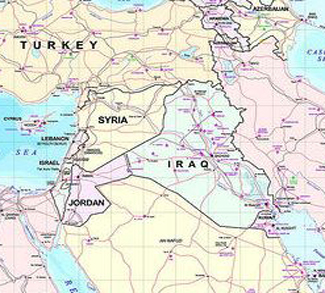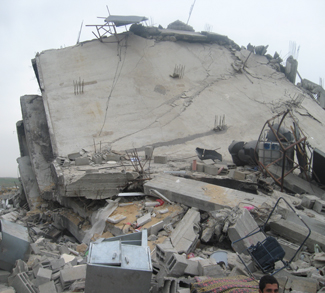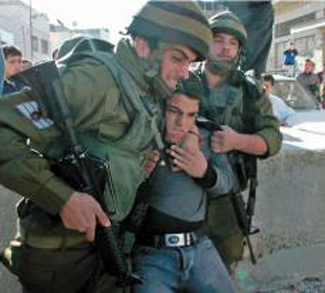FORECAST
On Friday, Hamas suspended its six-month truce with Israel, announcing that the ceasefire would not be extended.
The six-month ceasefire had already begun to unravel in November when Israeli army troops re-entered the Gaza Strip to conduct operations, resulting in retaliatory rocket attacks by Hamas. Intermittent exchanges between Israel and Hamas over the last few weeks left most commentators observing that the ‘truce’ remained in name only, but the fact is that although sporadic violence did erupt between the two adversaries, there was a significant and palpable drop in death and casualties during the six-month period.
In fact, Thursday’s exchange, in which Hamas launched 11 rocket attacks into southern Israel (a largely symbolic action aimed at firing shells into the desert) and Israel responded with at least two separate airstrikes, appears to be the usual tit-for-tat jockeying for position that has become commonplace along the Israeli-Gaza border.
However, Hamas’ call for an end to the six-month ceasefire portends an increase in the frequency and intensity of the violent exchanges.
Nonetheless, Hamas’ unilateral withdrawal from the ceasefire may be more calculated than at first glance.
The move comes just a few days after Palestinian President Mahmoud Abbas (aka Abu Mazen) announced that he will call a general election very soon. Previously, Abbas and his Fatah group had precipitated a constitutional crisis by refusing to step-down at the end of his tenure on January 8, 2008. He and his group claim that a passed but unsigned bill during Fatah’s tenure linking the presidential and general elections together allows Abbas to remain in power for one more year, until the general elections scheduled for January 2009.
By calling a general election a year earlier, Abbas maintains his weak legal claim of linking the presidential and general elections, while bowing to the will of the Palestinian people after polls had indicated a majority of Palestinians think his tenure should cease on January 8, 2009.
In all likelihood, Hamas is attempting to up the ante against Fatah by prompting an increase in violence during the month-long run up to the proposed January 2009 elections. Violent Israeli reactions consistently spike Hamas’ popularity, as opposed to their more moderate and, seemingly, more conciliatory rival, the Fatah group.
But do not expect Abbas’ Fatah group to remain dormant, leaving Hamas to control the initiative. In October, reports out of the West Bank indicated that with the support of Israeli special forces, 550 armed Fatah loyalists were moved into key positions in Hebron, the West Bank’s largest city and a stronghold of Hamas, in preparation for a showdown between the rivals.
Expect Israeli and American supported agent provocateurs from Fatah to infiltrate Gaza and provoke violent intra-Palestinian clashes. But unlike its previous failed attempt aimed at ousting Hamas from the Gaza Strip, the aim of Fatah’s provocation will be two-fold: first, use the international media, with support and influence from Israel and the U.S., to blame and condemn Hamas for the intra-Palestinian violence; second, use the clashes as a pretext for launching a ‘cleansing’ operation in Hebron (for which 550 Fatah militants were moved into position two months ago) aimed at clearing Hamas out of the West Bank.
Abbas hopes that by isolating Hamas’ West Bank supporters from the Gaza Strip and then systematically clearing out Hamas from the more heavily populated West Bank, his group will be in control of the Palestinian West Bank population, allowing Fatah to emerge victorious in the general and presidential elections on the strength of the West Bank’s pro-Fatah vote.
If Abbas’ play backfires, the whole of the Palestinian territories will be ruled by Hamas. Thus, in one month, all geopolitical calculations in the Middle East, including those upon which the world’s powers have attempted to reach peace, will be upended.
SUMMARY OF EVENTS: December 15 – 22, 2008
WORLD
Oil prices tumbled below $40 for the first time since the summer of 2004 Wednesday despite an announcement from OPEC of a record production cut of 2.2 million barrels a day.
NORTH AMERICA
United States
Monday, outgoing Vice President Dick Cheney made a startling statement on a nation-wide, televised broadcast, admitting that he approved the torture of detainees at the controversial Guantanamo Bay prison.
The number of people and institutions affected by an alleged $50bn investment fraud continues to grow in what may be one of Wall Street’s biggest scams.
The United State’s financial regulator has said it will launch an in-house investigation into why it failed to detect an alleged $50bn fraud scheme despite a decade of warning signs.
Bernard Madoff’s contention that he pulled off one of the biggest financial frauds in history without any help is being met with disbelief by his investors and experts in the securities industry.
Former White House Counsel Alberto Gonzales misled Congress when he claimed the CIA in 2002 approved information that ended up in the 2003 State of the Union speech about Iraq’s alleged effort to buy uranium for its nuclear weapons program, a House committee said Thursday.
The Pentagon is drawing up plans to shut the military prison at Guantanamo Bay, Cuba, to be prepared for any order from President-elect Barack Obama, who has promised to close the controversial facility after he assumes office Jan. 20, a defense official said Thursday.
The United States and Ukraine risked irking Moscow by signing a strategic accord Friday that calls for a US diplomatic post in Crimea, a Russian-speaking area where Russia’s Black Sea Fleet is based.
WESTERN EUROPE
Belgium
Belgium’s government collapsed on Friday after a top court found signs that it had sought to sway a legal ruling on the future of stricken bank Fortis.
Britain
Former intelligence chief Baroness Neville-Jones has urged Scotland Yard to sack one of its anti-terrorism advisers who is wanted by Interpol for terrorist offences.
France
France will deploy hundreds of extra police at busy public places in its main cities after dynamite was planted in a Paris department store, Interior Minister Michele Alliot-Marie said on Wednesday.
Greece
Greek protesters pushed their way into television and radio studios Tuesday, forcing broadcasters to put out anti-government messages in a change of tactics after days of violent street protests.
EASTERN EUROPE
Russia
A senior Russian military official expressed concern on Tuesday about what he said were U.S. plans to set up military bases in the former Soviet republics of Kazakhstan and Uzbekistan.
Russia will stop developing some strategic weapons if the United States drops plans for a missile shield in Europe, Interfax news agency quoted the commander of Russia’s strategic missile forces as saying on Friday.
MIDDLE EAST
Iran
Iran has documents to prove the United States and Britain, the Islamic Republic’s two Western arch foes, back a group that killed 16 abducted Iranian police officers, state radio reported on Saturday.
Iraq
Up to 35 officials in the Iraqi Ministry of the Interior ranking as high as general have been arrested over the past three days with some of them accused of quietly working to reconstitute Saddam Hussein’s Baath Party, according to senior security officials Wednesday in Baghdad.
A top Iraqi general said on Thursday that security forces reportedly arrested in connection with an attempted coup were actually detained on suspicion of aiding “terrorism.”
Iraqi authorities released without charge the nearly two dozen security officials who had been accused this week of conspiring to revive Saddam Hussein’s banned political party, the interior minister said Friday.
Israel
The Israeli government will send the head of political military policy in the Israeli Defense Ministry, Major General Amos Gilad, to try to press the Kremlin not to supply Iran with S-300 missile defense systems, according to Haaretz.
EAST ASIA
North Korea
North Korea raised tension with the South on Thursday by accusing its rich neighbor of being behind espionage plots to undermine its communist system by trying to set up a secret religion and assassinate leader Kim Jong-il.
SOUTH ASIA
Pakistan
Pakistani newspapers gave prominent coverage on Monday to a British media report that a retired general gunned down in Islamabad last month planned to blow the whistle on fellow generals’ dealings with the Pakistan Taliban.
After interrogating the sole surviving gunman, The Federal Bureau of Investigation (FBI) concluded that the ISI was cleared of any involvement in the Mumbai terror attacks on November 26, Pakistani daily The Dawn quoted diplomatic sources as saying on Thursday.
AFRICA
Rwanda
The Rwandan government has rejected a report by a U.N. panel of experts that accuses Kigali of supporting Tutsi rebels in eastern Democratic Republic of Congo, describing it as inaccurate and biased.
A UN-backed tribunal has convicted Theoneste Bagosora, a former Rwandan army colonel, of organizing the 1994 genocide in Rwanda.
Zimbabwe
Zimbabwe has accused Botswana of training opposition insurgents to oust President Robert Mugabe, state media said on Monday, increasing tensions between the neighbors and adding to doubts over a power-sharing deal.
Manjit Singh is a contributor to Geopoliticalmonitor.com



